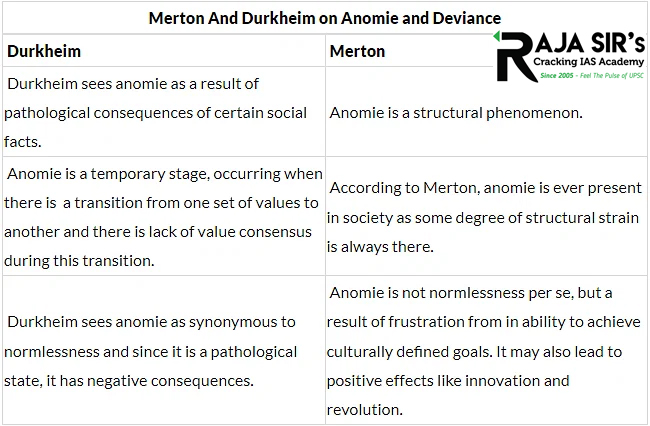- Home
- Prelims
- Mains
- Current Affairs
- Study Materials
- Test Series
 EDITORIALS & ARTICLES
EDITORIALS & ARTICLES
Critically examine how Durkheim and Merton explicate Anomie. (UPSC CSE Mains 2022 - Sociology, Paper 1)
Anomie refers to the lack of social or ethical standards in a group or individuals. Emile Durkheim was the first to introduce the term anomie. Later, the American sociologist Robert K. Merton developed and expanded on this theory. Although Merton’s theory of anomie is known as an extensiond of Durkheim’s theory of anomie, there are vital differences between them. According to Durkheim, anomie is normlessness, which is a result of the lack of social cohesion and solidarity that typically accompanies rapid social change. However, according to Merton’s theory of anomie, most people attempt to achieve culturally valued goals. When society does not provide people with the legitimate means to achieve culturally valued goals, they seek out alternative ways to break from the norms and achieve their goals, resulting in crime and deviance.
- While anomie for Durkheim is defined by unlimited aspirations, from Mertonian perspective, anomie is the lacks of legitimate means offor achieveing limited or even prescribed aspirations.
- Periods of time and speed of change are an important and determinant factor for Durkheim, but Merton has no attention to these factors.
- Durkheim pays attention to both acute anomie and chronic anomie, but Merton only studiesd the chronic anomie and for this reason, speed of change was no matter of importance in his theory.
- Durkheim emphasis on economic crises -boom or bust- and its social and moral consequences. Economic crises are roots of acute anomie. From Durkheimian perspective, anomie occur after economic crises (boom or bust); but Merton completely eliminates the issue of economic crisis.
- For Merton, unlike to Durkheim, ambition is not from the nature of human but is influenced by culture.
- Durkheim attends to the moral base of order, but versus Merton attends to the normative base of it (i.e) social order.
- For Durkheim’s opinion, higher classes are more exposed to anomie and its consequences like suicide., However, Merton believes that achieving goals and aspirations - the opportunity of success is not equal for all, and the lower class is more exposed to strain.; Thus this class is more likely to commit crimes or other non-conformity behaviors.
- From Durkheimian’s perspective, anomic situation can explain only a part of social problems and social deviances, but the theory of Merton triesy to explain the wider range of deviances.










 Latest News
Latest News General Studies
General Studies